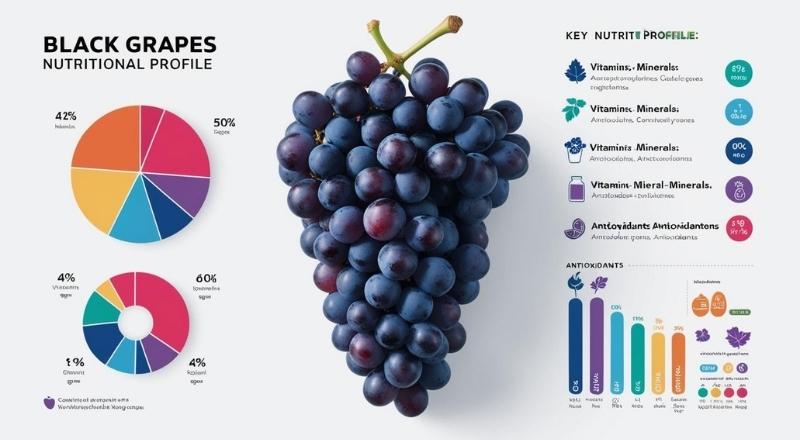- Introduction
- Overview of Black Grapes
- Nutritional Profile of Black Grapes
- Comparison with Other Fruits
- Caloric Content and Fiber Content
- Health Benefits of Black Grapes
- Black Grapes and Constipation Prevention: A Detailed Look
- Incorporating Black Grapes into Your Diet
- Recipe Ideas:
- Considerations and Precautions
- Conclusion
Introduction
Overview of Black Grapes
Black grapes, scientifically classified under the Vitis vinifera species, are dark-skinned fruits renowned for their rich color, sweet and sometimes subtly tart flavor, and versatility. Originating in the Middle East, the cultivation of black grapes has spread globally, with numerous varieties now grown for table consumption, winemaking, and the production of raisins and juice. These grapes are characterized by their dark pigmentation, which is indicative of a high concentration of beneficial plant compounds. Their cultivation thrives in temperate climates with warm summers, requiring well-drained soil and adequate sunlight to mature their characteristic sweetness and color. The size and seed content can vary significantly depending on the specific cultivar, ranging from small, seedless varieties to larger, seeded ones. Black grapes have a long history of culinary use and are increasingly recognized for their potential health benefits.
Importance of Health and Wellness in Modern Society
In contemporary society, there is a growing emphasis on the significance of proactive health management and overall wellness

Factors such as increased awareness of lifestyle-related diseases, the desire for improved quality of life, and advancements in nutritional science have contributed to this heightened focus. Modern lifestyles, often characterized by sedentary behavior, processed food consumption, and high stress levels, pose significant challenges to maintaining optimal health. Consequently, individuals are increasingly seeking information and adopting practices that promote physical, mental, and emotional well-being. This includes making informed dietary choices, engaging in regular physical activity, managing stress effectively, and prioritizing preventative healthcare measures. The understanding that diet plays a crucial role in disease prevention and the maintenance of good health has led to greater interest in nutrient-rich foods and their potential benefits.
Thesis Statement:
Black grapes are a powerhouse of nutrition that can significantly enhance health in various ways.

Black grapes, due to their impressive nutritional profile and abundance of bioactive compounds, stand out as a fruit with the potential to significantly enhance health through multiple mechanisms. This exploration will delve into the specific nutrients and phytochemicals present in black grapes, examining the scientific evidence supporting their beneficial effects on cardiovascular health, antioxidant defense, cognitive function, and other vital aspects of human well-being. By analyzing the components of black grapes and their corresponding health implications, this discussion aims to establish their role as a valuable addition to a health-conscious diet and highlight their potential contributions to overall wellness.
Nutritional Profile of Black Grapes
Black grapes possess a rich nutritional profile, offering a variety of health benefits. This document outlines their key nutritional components and provides a comparison with other fruits.
Expanded Nutritional Profile of Black Grapes
Black grapes, beyond their appealing dark hue and sweet taste, offer a rich and diverse array of nutrients that contribute significantly to overall health and well-being. This nutritional profile encompasses macronutrients, micronutrients, and a wealth of beneficial phytochemicals.

Macronutrient Composition: While relatively low in overall calories, black grapes provide a source of energy primarily through their natural sugars, predominantly glucose and fructose. They contain a modest amount of dietary fiber, crucial for digestive health, promoting regularity, and contributing to feelings of satiety. The fat content in black grapes is negligible, making them a naturally low-fat food.
Micronutrient Powerhouse: Black grapes contain multiple key vitamins and minerals. Rich in Vitamin K, these also play a key role in blood coagulation and maintaining healthy bones. Various B vitamins, such as thiamin, riboflavin, and vitamin B6, are present and play crucial roles in energy metabolism and nerve function. In terms of minerals, black grapes offer potassium, an electrolyte vital for maintaining healthy blood pressure and nerve signaling. They also contain copper and manganese, which act as cofactors for various enzymatic reactions in the body.
The Phytochemical Advantage:
Perhaps the most compelling aspect of the nutritional profile of black grapes lies in their abundant content of phytochemicals, particularly polyphenols. These naturally occurring plant compounds exhibit potent antioxidant and anti-inflammatory properties. Black grapes contain several key polyphenols, including:
- Resveratrol: This well-studied compound has been linked to various health benefits, including cardiovascular protection, anti-cancer properties, and potential neuroprotective effects. It is particularly concentrated in the skin of the grapes, contributing to their dark color.
- Anthocyanins: These pigments are responsible for the deep red, purple, or black coloration of many fruits and vegetables, including black grapes. Anthocyanins are powerful antioxidants that may help protect against oxidative stress and reduce the risk of chronic diseases.
- Flavonols: Quercetin and catechin are examples of flavonols found in black grapes. These compounds exhibit both antioxidant and anti-inflammatory effects, potentially promoting cardiovascular well-being.
Health Implications:
The rich nutritional profile of black grapes translates to numerous potential health benefits. The combination of antioxidants and anti-inflammatory compounds may help protect against cellular damage, reducing the risk of chronic diseases such as heart disease, certain cancers, and neurodegenerative disorders. The fiber content supports digestive health, while the vitamins and minerals contribute to various bodily functions.
Incorporating Black Grapes into the Diet: Black grape’s are a versatile and convenient fruit that can be easily incorporated into a healthy diet. They can be enjoyed fresh as a snack, added to fruit salads, used in smoothies, or even incorporated into savory dishes. Choosing fresh, whole black grapes ensures the intake of their complete nutritional benefits, including the valuable phytochemicals found in the skin.
black grape’s are more than just a tasty fruit. Their comprehensive nutritional profile, encompassing essential vitamins, minerals, fiber, and a remarkable array of health-promoting phytochemicals, makes them a valuable addition to a balanced diet, contributing to overall health and disease prevention.
Comparison with Other Fruits
While most fruits offer essential vitamins and minerals, black grapes distinguish themselves through their specific nutrient concentrations and unique compounds. Compared to some lighter-colored grapes, black grapes are often noted for higher levels of certain antioxidants, contributing to their deeper pigmentation. A detailed comparison with other common fruits, such as green grapes, berries, and apples, would highlight the specific strengths of black grape’s in terms of vitamin content (e.g., Vitamin K), mineral concentration (e.g., potassium), and antioxidant capacity (e.g., resveratrol and various flavonoids). This comparison would involve quantitative data per serving size for a clearer understanding of the nutritional advantages.
Key Nutrients Found in Black Grapes
Black grapes contain several key nutrients.
1. Vitamins: Black grapes contain various vitamins crucial for bodily functions.
- Vitamin C (Ascorbic Acid): Known for its immune-boosting properties and role in collagen synthesis, the Vitamin C content in black grapes contributes to overall health. Specific quantities would be beneficial for comparison.
- Vitamin K (Phylloquinone): Black grapes contain Vitamin K, which is essential for blood clotting and bone health. Please specify the quantity per serving.
- Other Vitamins: Further investigation may reveal the presence of other vitamins in smaller yet significant amounts, such as certain B vitamins or Vitamin A precursors.
2. Minerals: Black grapes provide essential minerals necessary for various physiological processes.
- Potassium: An important electrolyte that helps regulate fluid balance, nerve signals, and muscle contractions, potassium is found in notable amounts in black grapes. Including the milligrams per serving would provide more clarity.
- Iron: Black grapes contain iron, which is essential for oxygen transport in the blood and helps prevent iron deficiency. The amount per serving should be indicated.
- Other Minerals: Black grapes may also contain other minerals like manganese, copper, and magnesium in varying quantities, all contributing to different aspects of health.
3. Antioxidants: Black grapes are particularly recognized for their high antioxidant content, which helps protect the body against cellular damage caused by free radicals.
- Flavonoids: This diverse group of plant compounds includes anthocyanins (responsible for the dark color), flavanols, and quercetin, all of which exhibit potent antioxidant and anti-inflammatory effects. Detailing the specific types and their potential benefits would be valuable.
- Resveratrol: A well-studied polyphenol, resveratrol in black grapes has been linked to various health benefits, including cardiovascular protection and potential anti-cancer properties. Quantifying the resveratrol content is of significant interest.
- Other Antioxidants: Further research might identify other significant antioxidant compounds present in black grapes.
Caloric Content and Fiber Content

When considering the nutritional value of food, two key components are often analyzed: caloric content and fiber content.
Caloric Content refers to the amount of energy provided by a specific food or beverage. Calories are essential for bodily functions, but excessive intake can lead to weight gain. Different macronutrients (carbohydrates, proteins, and fats) contribute varying amounts of calories.
Fiber Content refers to the amount of dietary fiber present in a food. Fiber, a type of carbohydrate that the body cannot fully digest, plays a crucial role in digestive health, promoting regularity and preventing constipation. It also contributes to feelings of fullness, which can help manage weight.
Understanding the caloric and fiber content of foods allows individuals to make informed dietary choices, supporting weight management, digestive health, and overall well-being.
Health Benefits of Black Grapes

Black grapes offer a wide array of health advantages, largely attributed to their rich nutrient profile and potent bioactive compounds.
Powerful Antioxidant Properties:
Reduced Oxidative Stress: Black grapes boast a rich supply of antioxidants, such as resveratrol, anthocyanins, and flavonoids. Unstable molecules called free radicals can harm cells and lead to oxidative stress. These compounds work against free radicals. Black grape’s possess compounds that combat free radicals, thus protecting the body’s cells from harm.
Prevention of Chronic Diseases: The potent antioxidant properties of black grapes play a significant role in the prevention of various chronic diseases. Oxidative stress is a key factor in the development of conditions such as heart disease, cancer, Alzheimer’s disease, and type 2 diabetes. Regular consumption of black grape’s can help mitigate this stress and reduce the risk of these debilitating illnesses.
Promotion of Cardiovascular Health:
Improvement in Blood Flow: Certain compounds in black grape’s, particularly resveratrol, have been shown to promote the production of nitric oxide, a molecule that helps relax and widen blood vessels. This vasodilation effect improves blood flow, allowing for efficient delivery of oxygen and nutrients throughout the body.
Lowering Blood Pressure: The improved blood flow and the presence of potassium, a mineral known to counteract the effects of sodium, contribute to the blood pressure-lowering effects of black grapes. Maintaining healthy blood pressure is crucial for preventing hypertension and reducing the risk of heart attacks and strokes.
Cholesterol Management: Studies suggest that the antioxidants in black grapes can help manage cholesterol levels. They may help reduce the oxidation of LDL (bad) cholesterol, a process that contributes to the formation of plaque in the arteries. Fiber may also help lower cholesterol absorption in the digestive system.
Significant Anti-Inflammatory Effects:
Reduction of Inflammation Markers: Chronic inflammation is implicated in many diseases. Black grapes contain compounds that exhibit anti-inflammatory properties, helping to reduce the levels of inflammatory markers in the body. This can contribute to overall well-being and disease prevention.
Benefits for Arthritis and Other Inflammatory Conditions: The anti-inflammatory effects of black grapes may provide relief from conditions characterized by inflammation, such as arthritis. Regular consumption might help reduce pain, stiffness, and swelling associated with these conditions, improving mobility and quality of life.
Potential for Cancer Prevention:
Compounds that Inhibit Cancer Cell Growth: Black grapes contain various phytochemicals, including resveratrol, which have demonstrated potential in inhibiting the growth and spread of cancer cells in laboratory studies. These compounds might disrupt various phases of cancer progression.
Studies Supporting These Claims: Ongoing in vitro and animal research indicates that compounds found in black grapes may have the potential to prevent or slow the progression of various Cancers such as colon, prostate, breast, and lung cancer.
Enhancement of Skin Health:
Benefits of Vitamins and Antioxidants for Skin: Black grapes are a source of essential vitamins, such as vitamin C and vitamin K, along with powerful antioxidants. These nutrients help maintain healthy skin by shielding it from harm caused by UV rays and free radicals. In addition, they support collagen production, a key factor in maintaining skin elasticity and firmness.
Natural Remedy for Aging: Neutralizing free radicals can help reduce wrinkles, fine lines, and age spots, contributing to a more youthful appearance.
Support for Digestive Health:
High Fiber Content and Benefits for Gut Health: Black grape’s are a good source of dietary fiber, which plays a crucial role in maintaining a healthy digestive system. Fiber increases stool bulk, which encourages regular bowel movements and fosters the development of healthy gut bacteria. A diverse well-balanced gut microbiome is essential for supporting a robust immune system and promoting overall health.
Prevention of Constipation: The high fiber content in black grapes helps prevent constipation by adding bulk to the stool and facilitating its passage through the digestive tract. Regular consumption can contribute to digestive regularity and comfort.
Black Grapes and Constipation Prevention: A Detailed Look
Black grape’s are a natural and effective dietary aid in the prevention of constipation, primarily due to their substantial fiber content. Dietary fiber, an indigestible plant material, plays a crucial role in maintaining healthy bowel function.
When consumed, fiber absorbs water in the digestive tract, increasing the volume and softening the consistency of the stool. Fiber’s bulk increases the volume of waste, which stimulates peristalsis. Rhythmic muscle contractions called peristalsis propel waste through the digestive system. By facilitating smoother and more efficient movement of stool, black grapes help prevent the hard, dry stools that characterize constipation.
The presence of both soluble and insoluble fiber in black grapes contributes to their beneficial effects. Insoluble fiber adds bulk to the stool, while soluble fiber forms a gel-like substance that helps regulate bowel movements.
This comprehensive method addresses digestive regularity through a dual-action approach. Regular inclusion of black grapes in the diet can contribute to a more predictable and comfortable bowel elimination pattern, reducing the likelihood of straining and discomfort associated with constipation.
Furthermore, maintaining digestive regularity through adequate fiber intake, such as that provided by black grapes, is important for overall gut health and may play a role in preventing other digestive issues.
Incorporating Black Grapes into Your Diet

Black grapes offer a versatile and delicious way to enhance your nutritional intake. Whether enjoyed fresh, dried, or incorporated into various culinary creations, they provide numerous health benefits and a burst of flavor.
Fresh Black Grapes:
Enjoying fresh black grapes is the simplest way to reap their rewards. Their crisp texture and sweet-tart taste make them a delightful snack on their own. Consider adding them to fruit salads for a vibrant mix of colors and flavors, or pair them with cheese and crackers for an elegant appetizer. Frozen black grapes also make a refreshing and healthy treat, particularly during warmer months.
Dried Black Grapes (Raisins):
Black raisins are a concentrated source of sweetness and nutrients. They make a convenient and energy-boosting snack. Incorporate them into your morning oatmeal or granola, add them to trail mix for sustained energy during outdoor activities, or sprinkle them over yogurt for added texture and flavor. In baking, black raisins add moisture and sweetness to breads, muffins, cookies, and cakes.
Juices and Smoothies:
Black grape juice is a refreshing and nutritious drink. Choose unsweetened options to eliminate extra sugars. Blend fresh or frozen black grapes into smoothies for a nutrient-rich and colorful drink. Combine them with other fruits, vegetables, yogurt, or protein powder to create personalized and healthy smoothies.
Recipe Ideas:
Black grapes can be into a wide variety of both sweet and savory culinary preparations:
1. Salads: Add halved black grapes to green salads for a touch of sweetness and a juicy counterpoint to savory elements like feta cheese, grilled chicken, or nuts. They also work well in grain salads with quinoa or farro, adding a burst of flavor and moisture.
2. Breakfast Bowls: Enhance your breakfast bowls with the goodness of black grapes. Layer them on top of yogurt or cottage cheese with granola and other fruits. Incorporate them into overnight oats for added sweetness and texture that softens overnight.
3. Desserts: Black grape’s can be used in various dessert preparations. Bake them into tarts or pies for a naturally sweet and slightly tangy filling. Use them to garnish cakes, cupcakes, or ice cream. Consider making a simple black grape compote to serve warm over pancakes or waffles, or chilled as a light dessert.
Considerations and Precautions

Possible Allergies: It is crucial to be aware of potential allergic reactions to any of the ingredients. Individuals with known allergies should carefully review the ingredient list before consumption. Common allergens include, but are not limited to, nuts, seeds, dairy, gluten, soy, and certain fruits or vegetables. If any signs of an allergic reaction occur, such as hives, itching, swelling, difficulty breathing, or gastrointestinal distress, consumption should be discontinued immediately and medical attention sought.
Moderation in Consumption: While beneficial, it is advisable to consume this product in moderation as part of a balanced diet. Overconsumption of any single food or ingredient can potentially lead to adverse effects or imbalances in the body. Pay attention to recommended serving sizes and consider individual dietary needs and health conditions.
Importance of Organic Options to Avoid Pesticides: When possible, choosing organic options for the ingredients is highly recommended. Organic farming practices prohibit the use of synthetic pesticides, herbicides, and genetically modified organisms (GMOs), thereby reducing potential exposure to these substances. Pesticide residues on conventionally grown produce have been linked to various health concerns, making organic choices a preferable option for minimizing these risks and supporting sustainable agriculture.
Conclusion
Recap of Health Benefits
In summary, the regular consumption of black grapes offers a wealth of health advantages. Their rich antioxidant profile, stemming from compounds like resveratrol and anthocyanins, combats oxidative stress and inflammation, contributing to the prevention of chronic diseases such as heart disease and certain cancers. The presence of these powerful antioxidants also supports brain health, potentially improving cognitive function and protecting against age-related neurodegenerative conditions. Furthermore, black grapes contribute to healthy digestion due to their fiber content, and their natural sugars provide a sustained energy source. The vitamins and minerals present, including vitamin C and potassium, further bolster the immune system and support various bodily functions.
Motivation to Include Black Grape’s in Daily Diet
Given the extensive array of health benefits outlined. Incorporating black grapes into your daily dietary routine is a proactive step towards enhancing overall well-being. Unlike processed snacks or sugary treats, black grapes offer a natural and delicious way to nourish your body with essential nutrients and disease-fighting compounds. Their versatility allows for easy integration into various meals and snacks, making them a convenient and enjoyable addition to a healthy lifestyle. From boosting cardiovascular health and cognitive function to supporting immunity and digestion. The compelling health advantages of black grapes provide a strong motivation to make them a regular part of your diet.
Call to Action: Explore Ways to Enjoy Black Grape’s for Better Health
Embrace the opportunity to enhance your health by actively exploring diverse and appealing ways to incorporate black grapes into your daily life. Consider adding them to your morning oatmeal or yogurt, blending them into refreshing smoothies, or tossing them into salads for a burst of sweetness and antioxidants. They also make a convenient and healthy snack on their own or paired with nuts and cheese. Experiment with using them in culinary creations, such as adding them to fruit tarts or incorporating them into savory dishes. By creatively finding enjoyable ways to consume black grape’s, you can readily harness their numerous health benefits and embark on a delicious path towards improved well-being.
Visit support of our page: Pear fruits: Pears are one of the strongest fruits
